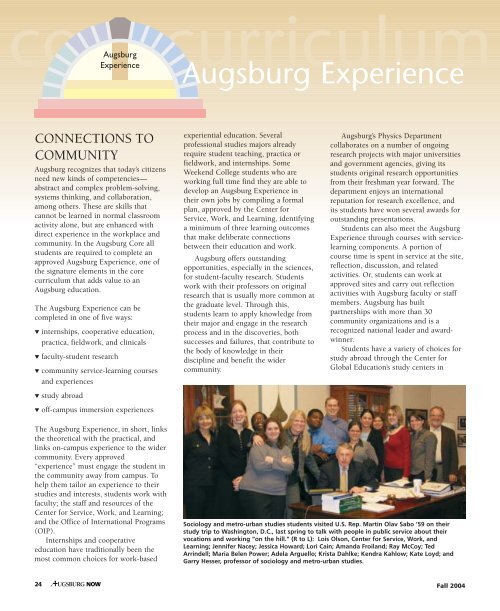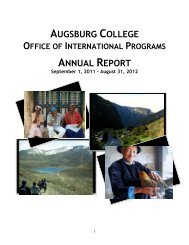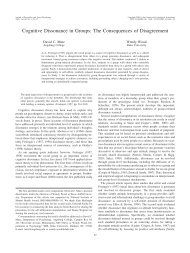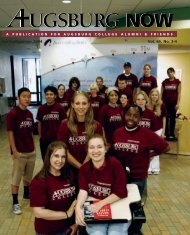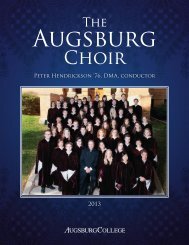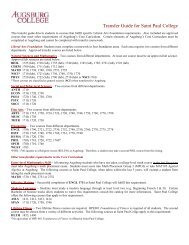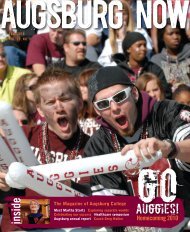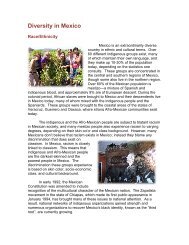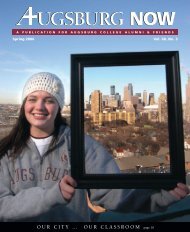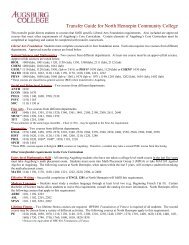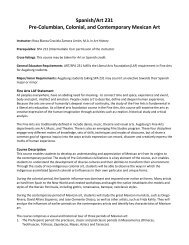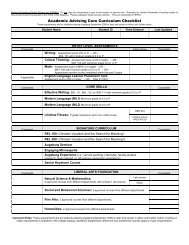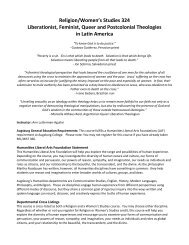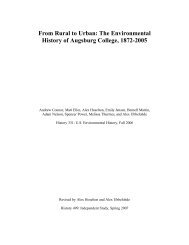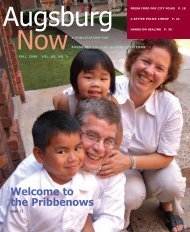Download the Fall 2004 PDF - Augsburg College
Download the Fall 2004 PDF - Augsburg College
Download the Fall 2004 PDF - Augsburg College
You also want an ePaper? Increase the reach of your titles
YUMPU automatically turns print PDFs into web optimized ePapers that Google loves.
core curriculum<strong>Augsburg</strong> ExperienceCONNECTIONS TOCOMMUNITY<strong>Augsburg</strong> recognizes that today’s citizensneed new kinds of competencies—abstract and complex problem-solving,systems thinking, and collaboration,among o<strong>the</strong>rs. These are skills thatcannot be learned in normal classroomactivity alone, but are enhanced withdirect experience in <strong>the</strong> workplace andcommunity. In <strong>the</strong> <strong>Augsburg</strong> Core allstudents are required to complete anapproved <strong>Augsburg</strong> Experience, one of<strong>the</strong> signature elements in <strong>the</strong> corecurriculum that adds value to an<strong>Augsburg</strong> education.The <strong>Augsburg</strong> Experience can becompleted in one of five ways:▼ internships, cooperative education,practica, fieldwork, and clinicals▼ faculty-student research▼ community service-learning coursesand experiences▼ study abroad▼ off-campus immersion experiencesexperiential education. Severalprofessional studies majors alreadyrequire student teaching, practica orfieldwork, and internships. SomeWeekend <strong>College</strong> students who areworking full time find <strong>the</strong>y are able todevelop an <strong>Augsburg</strong> Experience in<strong>the</strong>ir own jobs by compiling a formalplan, approved by <strong>the</strong> Center forService, Work, and Learning, identifyinga minimum of three learning outcomesthat make deliberate connectionsbetween <strong>the</strong>ir education and work.<strong>Augsburg</strong> offers outstandingopportunities, especially in <strong>the</strong> sciences,for student-faculty research. Studentswork with <strong>the</strong>ir professors on originalresearch that is usually more common at<strong>the</strong> graduate level. Through this,students learn to apply knowledge from<strong>the</strong>ir major and engage in <strong>the</strong> researchprocess and in <strong>the</strong> discoveries, bothsuccesses and failures, that contribute to<strong>the</strong> body of knowledge in <strong>the</strong>irdiscipline and benefit <strong>the</strong> widercommunity.<strong>Augsburg</strong>’s Physics Departmentcollaborates on a number of ongoingresearch projects with major universitiesand government agencies, giving itsstudents original research opportunitiesfrom <strong>the</strong>ir freshman year forward. Thedepartment enjoys an internationalreputation for research excellence, andits students have won several awards foroutstanding presentations.Students can also meet <strong>the</strong> <strong>Augsburg</strong>Experience through courses with servicelearningcomponents. A portion ofcourse time is spent in service at <strong>the</strong> site,reflection, discussion, and relatedactivities. Or, students can work atapproved sites and carry out reflectionactivities with <strong>Augsburg</strong> faculty or staffmembers. <strong>Augsburg</strong> has builtpartnerships with more than 30community organizations and is arecognized national leader and awardwinner.Students have a variety of choices forstudy abroad through <strong>the</strong> Center forGlobal Education’s study centers inThe <strong>Augsburg</strong> Experience, in short, links<strong>the</strong> <strong>the</strong>oretical with <strong>the</strong> practical, andlinks on-campus experience to <strong>the</strong> widercommunity. Every approved“experience” must engage <strong>the</strong> student in<strong>the</strong> community away from campus. Tohelp <strong>the</strong>m tailor an experience to <strong>the</strong>irstudies and interests, students work withfaculty; <strong>the</strong> staff and resources of <strong>the</strong>Center for Service, Work, and Learning;and <strong>the</strong> Office of International Programs(OIP).Internships and cooperativeeducation have traditionally been <strong>the</strong>most common choices for work-basedSociology and metro-urban studies students visited U.S. Rep. Martin Olav Sabo ’59 on <strong>the</strong>irstudy trip to Washington, D.C., last spring to talk with people in public service about <strong>the</strong>irvocations and working “on <strong>the</strong> hill.” (R to L): Lois Olson, Center for Service, Work, andLearning; Jennifer Nacey; Jessica Howard; Lori Cain; Amanda Froiland; Ray McCoy; TedArrindell; Maria Belen Power; Adela Arguello; Krista Dahlke; Kendra Kahlow; Kate Loyd; andGarry Hesser, professor of sociology and metro-urban studies.24<strong>Fall</strong> <strong>2004</strong>


